Jim Austin, executive director-treasurer of the South Carolina Baptist Convention for the past nine months, and Alabama evangelist Junior Hill, “who has preached to our hearts time and time again through the years,” brought messages of challenge and encouragement at the state Baptist evangelism conference Feb. 25-26 at First Baptist Church in Rock Hill.
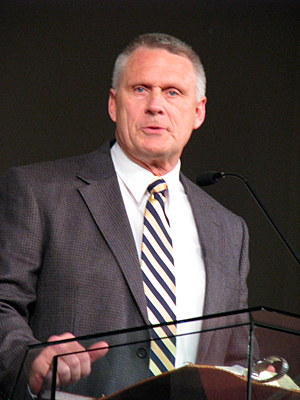 Jim Austin
Jim AustinIt was the first time that Rock Hill, viewed as one of the fastest-growing areas of the state, has hosted the annual meeting, which has been a staple of South Carolina Baptist life for decades.
Austin, who came to the state from the Missouri Baptist Convention and was attending his first evangelism meeting here, offered a challenge for Baptists to lead with humility, recognizing that “we’re nobody special, but we serve a special God.”
The SCBC’s top official urged his audience to aim for “the highest and best” rather than the “lowest and least” in their lives, to resist “doing just enough to get by.”
He called on South Carolina Baptists to “pour your lives into others” and to create “multiple generations” of disciples of Jesus, “teaching faithful people who will, in turn, teach others.”
“You will sometimes be surprised by the influence you have on others,” he said.
“Don’t compromise the word of God,” Austin declared. “Preach the word fully.”
He also underscored the need for Baptists to regard each other as brothers and sisters in Christ, noting that “it has never been more important than today for us to relate to each other as family.”
“Let us covenant together on the essentials of our faith,” he told those attending the conference, “and give grace on everything else.”
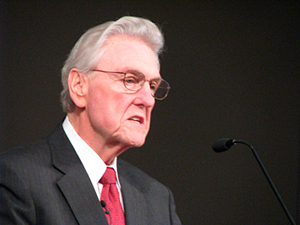 Junior Hill
Junior HillHill said to a group made up primarily of pastors, “We all know what it’s like to preach and the aisles are empty.”
The Alabama evangelist told of the time when Jesus instructed his disciples – all of them professional fishermen – where to cast their nets for a large catch.
Hill, who has preached more than 1,500 revivals and crusades, said that “the catch must never determine the commitment.”
Reminding that the Bible is the net to be used by fishers of men, Hill, who became a pastor at age 19, said, “You don’t throw out the net because you love souls, but because you love the Savior. You throw out the net because Jesus told you to.”
Some, he noted, are “more interested in the catch than in the command of Jesus to cast the net.”
Hill also declared that “observation (our assessment of who may or may not respond) should never overshadow proclamation.”
“Take the Bible in your hand and preach, and let a sovereign God determine who will respond.”
He also said that “success must never supplant the Savior,” adding, “I am weary of guys who are successful and want you to know it.”
Failure for a church to grow is not always the fault of the pastor, Hill underscored. “Some churches wouldn’t grow if Moses were the pastor and Elijah the education director.”
As was the case that day on the Sea of Galilee, Hill pointed out, the disciples who brought in the big catch felt no pride, and those less successful showed no jealousy, because they were “partners who pursued Jesus.”
“Brothers and sisters,” Hill concluded, “We are partners.”
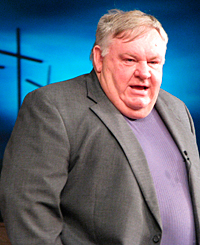 Ron Barker
Ron BarkerRon Barker, leader of the church multiplication group of the South Carolina Baptist Convention, said that early on in his ministry, which included work on the staff of First Baptist Church in Atlanta, that “the pool of the lost was growing” and that the church “wasn’t making footprints in the lost community.”
He pointed out, also, that “many Baptists don’t want lost people to show up at church,” that they sometimes are “rejected by the churches.”
“Do you know why the lost don’t go to church?” he asked, and then answered, “They’ve been.”
“We say we believe the Bible,” he declared. “We’ve got to start practicing it.”
He said that “our buildings have shaped us,” but they are not the church. The buildings, he noted, are “where we meet to praise the Lord,” emphasizing that “Christ is in each of us, and the sanctuary is the heart in which God is present.”
Barker, formerly with the Missouri Baptist Convention, said that the church must “equip the saints” for service, saying that “the potential to reach South Carolina (which has 3 million people who are “lost”) is not in the pulpit, but in the pew.”
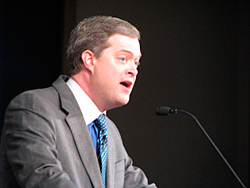 Stephen Rummage
Stephen RummageStephen Rummage, preaching pastor of Hickory Grove Baptist Church in Charlotte, N.C., spoke of his deepening commitment to prayer, asking himself, “What would happen if I prayed more and did other things less? Would any area of my life suffer if I prayed more?”
“In each area,” he said, “the answer was no.”
He said he then made a commitment to be “a man of prayer, not just a man who prays.”
“Pray with expectancy,” the former professor at Southeastern Baptist Seminary said, “as a child coming to a father who would never give him anything harmful.”
He said that people of prayer must also “seek, to hunt, to pursue with determination until you get what you are seeking” while asking, ‘What can I do to be part of the answer to my prayer?’?”
Rummage urged his audience to “go after God’s purposes for your lives with all of your effort.”
He spoke of the need for persistence in prayer, explaining that while “God is not hard of hearing,” believers should “knock with endurance” with the assurance that “you will receive.”
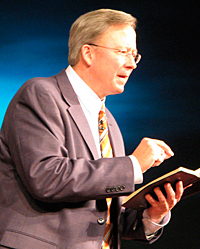 David Uth
David UthDavid Uth, pastor of First Baptist Church in Orlando, Fla., spoke of the need for sowing the seeds of the kingdom of God in the assurance that “if we sow, we will reap.”
“God promised a harvest, and he does what he says,” declared the Florida pastor, “so we ought to be sowing – and sowing bountifully, which means sharing Christ.”
Uth said that people in the church are eager to share their faith and are passionate about it, so “just turn them loose and release an army of sowers.”
He said that sowing must be intentional, never accidental, and is relational, making use of “the relationships we already have.”
Sowing also is spiritual, he emphasized. “The seed we sow is powerful,” he pointed out. “It is not how we sow – not the presentation. It’s the power of God, and the seed always does what God intended.”
Uth urged his audience to sow with tears, with compassion, which “means you care.”
It is the prime principle of church growth, he said, that “people go where they are loved – period.”
“Sow with tears,” he underscored, “and reap with joy. Rejoice over what God and heaven rejoice over. Heaven celebrates when a sinner comes home. When that happens, there is a party in heaven.”
The emphasis of the Rock Hill conference was to encourage churches to commit to “the things Christ says are important,” based on Matthew 28:16-20.